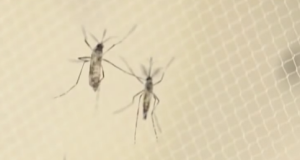Zika fever is a mild non-contagious illness that is caused due to transmission of Zika virus via the bite of Aedes mosquitoes that occur all over the globe.
There is some evidence that suggests a link between Zika virus infection in mothers and the occurrence of potentially life-threatening congenital condition called microcephaly in newborns. It is also believed that the virus can cause other neurological conditions like Guillain-Barre syndrome. This is the reason why Zika fever is a cause for concern, especially for pregnant women.
Zika was identified for the first time in 1947 in Africa’s Zika valley. Since then outbreaks have occurred in the Pacific Islands, southern and southeastern Asia, and the Americas. Since mid-2015, Brazil has reported a massive number of Zika fever infection cases. The first case of Zika virus in the US was detected in Dec 2015 in Puerto Rico. There have been no other cases of locally transmitted Zika fever in the US, but some instances have been found in travelers returning from infected regions.
There is no vaccine to prevent Zika fever and no specific antiviral treatment is effective. However, associated symptoms typically resolve in a week and patients tend to fully recover. Hospitalization, even in severe cases, is rare. Patients may consume fluids, take rest, and take medications for pain and fever to alleviate the symptoms of Zika virus infection.
Symptoms of Zika Fever
People infected by Zika virus usually do not elicit any symptoms. However, if the symptoms occur, then they may be seen 2 to 7 days after a person is exposed to the virus via a mosquito bite, and last for many days to a week or more.
Some common signs and symptoms are as follows:
- The most common symptom of Zika fever is mild fever or illness.
- Joint pain, skin rash, and red eyes or conjunctivitis is also prevalent.
- Some patients may suffer from headache, muscle pain, generalized or overall discomfort, vomiting, and pain behind the eyes.
Causes of Zika Fever
Zika fever is caused due to infection by Zika virus. Zika virus is transmitted via the bite of Aedes genus mosquitoes infected by the virus. These mosquitoes are the same ones that transmit diseases like chikungunya and dengue.
The Aedes mosquitoes typically like to bite humans and often during the daytime. The live outdoors and indoors near humans. They breed and lay eggs in and around standing water such as in pots, vases, buckets, flower pots, pet bowls, etc. The mosquito tends to get infected when it bites a human with Zika virus infection and then proceeds to spread the virus to healthy people when it bites them.
As per some reports, blood transfusion, contact with infected blood, and sexual contact with an infected person may also result in transmission of the virus.
It is possible for Zika virus to pass onto a newborn from an infected mother during delivery. This is uncommon.
In rare cases, Zika fever virus may also transmit from a pregnant woman to the fetus.
Treatment of Zika fever
Currently there is no vaccine to prevent Zika fever. However, many vaccine companies are working towards developing a Zika fever vaccine.
There is no specific treatment for curing Zika fever. Treatment is mostly based on alleviation of symptoms.
- Patients need to take rest and allow the body to recover from the effects of the virus.
- Prevent dehydration by drinking lots of water
- Fever, joint pain, and other kinds of discomfort and pain can be alleviated with painkillers and other medications. It is important to consult a doctor before taking any kind of medicine to find relief from the symptoms of Zika fever.
- As Zika virus infection during pregnancy can lead to development of serious complications in newborns, pregnant women should avoid going to areas with mosquito infestation, especially those regions with known cases of Zika fever.
Prevent mosquito bites by following certain protective measures and guidelines like:
- Wear pants and long sleeved shirts and try to cover-up the body as much as possible
- Use picaridin or DEET containing insect repellants
- Stay in places that are screened-in, or with air-conditioning, or stay indoors with door and window screens.
Genetically engineered mosquitoes have been developed by a British company to overcome dengue. These mosquitoes transmit a fatal gene to its offspring thereby causing the newborn mosquitoes to die before they attain adulthood. It is postulated that this method can be used to curb the menace of Zika virus transmission. Female mosquito bites are responsible for causing Zika fever. These genetically modified mosquitoes are males; hence they can be easily released into the wild for mating without increasing the risk of them causing Zika fever infections.
Infecting mosquitoes with Wolbachia bacteria may also help combat Zika virus spread. This bacteria significantly inhibits mosquitoes from getting infected and/or passing infections to humans via their bites.

